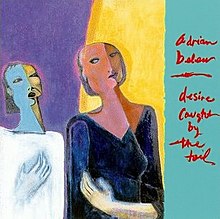Loading AI tools
1986 studio album by Adrian Belew From Wikipedia, the free encyclopedia
Desire Caught by the Tail is the third solo album by Adrian Belew, released in 1986.[3][4] It is an instrumental record that was written, arranged and performed by Belew alone.
| Desire Caught by the Tail | ||||
|---|---|---|---|---|
 | ||||
| Studio album by | ||||
| Released | 1986 | |||
| Recorded | 1985–86 | |||
| Studio | Creative Audio, Urbana, IL | |||
| Genre | Experimental | |||
| Length | 32:59 | |||
| Label | Island[1] | |||
| Producer | Adrian Belew | |||
| Adrian Belew chronology | ||||
| ||||
Unlike its predecessors Lone Rhino and Twang Bar King, Desire Caught By the Tail is an entirely experimental album. It was recorded using treated, multi-tracked electric guitars, guitar synthesizer, keyboards and assorted percussion instruments.
The title Desire Caught by the Tail is from the play 'Le Désir attrapé par la queue', written by Pablo Picasso. The album is in part inspired by Picasso, with both the sound and the composition style being more abstract, harsh and loosely structured than much of Belew's other solo repertoire.
The New York Times wrote that "by multitracking guitars and percussion, [Belew] can follow odder whims - inventing quasi-Middle Eastern folk melodies (and making his guitar sound like a musette), melting down tunes halfway through, piling up electronic yowls and twitters. Mr. Belew mixes eerie resonances and slapstick timing; even in instrumentals, his grin comes through."[5]
Belew reused a part of "Tango Zebra" as "Peace On Earth" on his 1994 album Here.
All tracks written and arranged by Adrian Belew.
Seamless Wikipedia browsing. On steroids.
Every time you click a link to Wikipedia, Wiktionary or Wikiquote in your browser's search results, it will show the modern Wikiwand interface.
Wikiwand extension is a five stars, simple, with minimum permission required to keep your browsing private, safe and transparent.